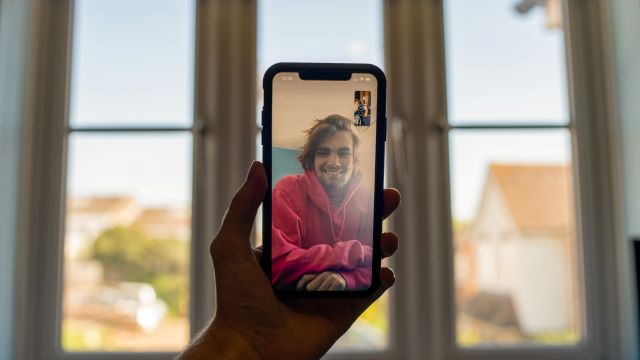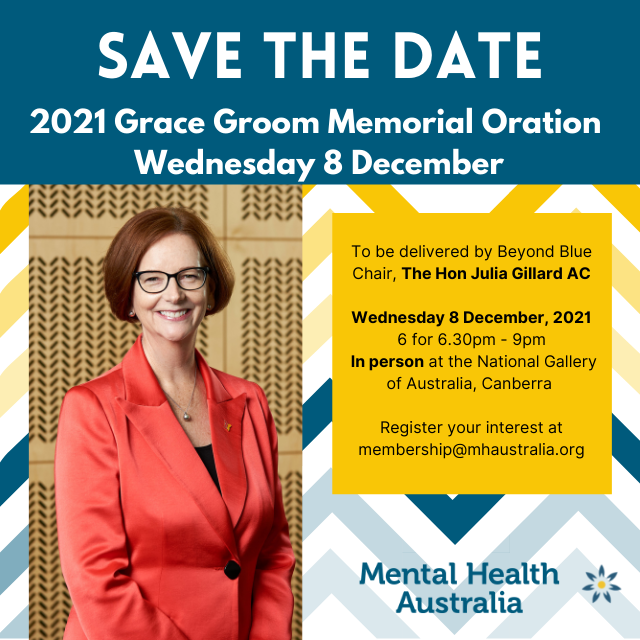
I recently took part in making a video for WHO on Australia’s response to Covid-19 so far. Mine was a small segment on the mental health impacts and our responses, but it was a useful opportunity for me to review the past 12 months or so since I took up the position of Deputy Chief Medical Officer (mental health) with the Department of Health. Recognition of the impact of the changes wrought by the pandemic on individuals, families and communities has resulted in a range of service responses – some new like the Head to Help services in Victoria, some pre-existing services bringing new service components like beyondblue, and a number which have expanded their capacity and capability. Increased sessions under Better Access have been made available, and Better Access has expanded into other settings like Residential Aged Care Facilities. Mental Health services funded through States and Territories have expanded, and of course, we experienced a burgeoning of telehealth in many settings.
These service enhancements have certainly been needed, and have been utilised by many. As I write this, many parts of Australia are in lockdown, or face restrictions on movement. We have seen a sustained increase in the presentation of people in distress, especially younger people presenting to Emergency Departments with thoughts of self-harm or even suicide. Some services are difficult to access, with increased wait times for access to private psychiatry and psychology, and some headspace services. There has been an increased awareness of the importance of mental health and wellbeing and a greater willingness of services and governments to work together to address these concerns.
Which brings me to hopes for the future. We have had many reports describing what is wrong with our mental health system, and what is needed to make sustained and tangible improvements. Key to this is how the component parts work together so that they are being utilised by those who need a given level of service and people are able to move between service types without experiencing delay and repetition. I think there is great goodwill between providers and funders to work together to realise the recommendations of recent reports – all of which were written in the context of extensive consultation across the sector, consumers and carers. There are of course many challenges, not least of which are finding the right mix and distribution of a skilled workforce, suitable amenities so that services are experienced as safe and welcoming, and infrastructure that allows for reporting and oversight to hold governments and providers accountable. Lots of work to be going on with!
My thanks to all who have contributed to the plans and reports that have provided such clear direction to those of us who work in health bureaucracy. We have a great opportunity to improve our mental health system in ways which I hope will be welcomed by those who experience mental illness, their carers and supporters, and the professionals who work in this often challenging area.
Dr Ruth Vine
Deputy Chief Medical Officer for Mental Health
Review of Disability Support Pension eligibility tables
Mental Health Australia is preparing a response to the Department of Social Services Review of the DSP Impairment Tables. If you would like to provide feedback to inform Mental Health Australia’s response, please contact policy@mhaustralia.org by Friday 16 July.
Individuals and organisations can also provide comments directly to the Department here.
Save the date: Grace Groom Memorial Oration

On Wednesday 8 December, Mental Health Australia’s annual Grace Groom Memorial Oration will be delivered by Beyond Blue Chair, The Hon Julia Gillard AC. We are planning an in-person event at the National Gallery of Australia, Canberra, at 6 for 6.30pm until 9pm (we are also planning for alternative contingencies in the event of changing public health advice related to COVID-19). Register your interest by emailing membership@mhaustralia.org.
|
On Tuesday, Mental Health Australia will be participating in a range of NAIDOC events.
On Wednesday, we will be meeting with the Australian Bureau of Statistics to discuss inclusion strategies for the next census and participating in a sector briefing with Health Justice Partnerships Australia.
On Thursday, we will be participating in an NDIS workforce workshop being run by Mental Health Victoria and in a Pro Bono masterclass on Building sustainable and high-impact programs for First Nations and other vulnerable communities. Also so on Thursday, our Embrace Project Team will be meeting with the Department of Health to continue discussions about the next steps for the project through to 2025.
|
|
Member Benefits, Jobs and Profiles
|
|
|
|
Communicate your news, job vacancies, or upcoming events to more than 5,000 people in the mental health ecosystem weekly.
Mental Health Australia members are invited to send us news, announcements, job vacancies, events or other notices for inclusion in the Weekly CEO Update newsletter. To do so, simply fill out this form by COB each Wednesday for your notice to appear in the newsletter the following Friday.
Member Profiles

Mental Health Community Coalition ACT
MHCC ACT is the peak body representing the community managed mental health sector in the ACT. Our aim is to foster the capacity of the sector to deliver quality, sustainable, recovery-oriented services to support people with mental health issues and their carers.

Australian Red Cross
Australian Red Cross is building a better society based on people helping people.
They save lives and support people before and after disasters strike. They work to alleviate suffering during wars and conflict and promote the laws of war. And they work to assist the most vulnerable community members – no matter their circumstances.
They work with politicians, policy-makers, organisations and the public to improve the situation of the most vulnerable people in Australia and around the world.
|
|
|
Embrace Multicultural Mental Health News
|
In-language resources on the current Public Health Orders in NSW
NSW Health has produced resources and social media tiles explaining the current NSW stay-at-home order and advice for religious services and places of worship in 52 languages. These resources are available here. Other resources (by topic) for NSW are also available.

|
Screens seem ok for young people in lockdown
Young adults have suffered disproportionate mental illness during the COVID-19 pandemic due to a combination of employment, study, and financial challenges specific to their transitional stage of life, but green infrastructure and screen time appear to help, a new study from the University of Adelaide has found. The new study, which surveyed more than 1000 young Australians and is published in the International Journal of Environmental Research and Public Health, found that the pandemic has been linked with widespread mental illness in a sample of young people aged 18-24 years.
Read more
Mental health funding boosts support for young Victorian carers
The Victorian Government will provide an $11.98 million funding boost to help the Satellite Foundation further expand its range of programs and support services. Young people will be engaged throughout the process to help ensure all activities are age-appropriate, accessible and effective. The Foundation will also partner with schools to deliver programs and resources that encourage conversations about mental illness and its impact on the mental health of young carers and families.
Read more
|
|
|
Beyond Blue available to support NSW through the latest COVID-19 restrictions
Beyond Blue is reminding NSW residents that the Coronavirus Mental Wellbeing Support Service is available to support their mental health and wellbeing during the pandemic. The free support service is available 24/7 at coronavirus.beyondblue.org.au and 1800 512 348. Mental health professionals are available to provide immediate counselling, advice and referrals tailored to the pandemic.
Immunisation history statement available for consumers in My Health Record
You can now get your immunisation history statement from My Health Record to show proof of your vaccinations. The statement is also available if you’re not eligible for Medicare and have a record. Learn more about the statements and My Health Record here.
Webinar: My Health Record in Residential Aged Care
The Australian Digital Health Agency will be hosting a webinar on Tuesday 20 July at 11am AEST to help consumer peaks, their members and affiliates and consumer advocates understand My Health Record’s main features and benefits. Participants will learn what documents are available, how to access the record, set access controls and add information. The webinar will also focus on how healthcare providers can access aged care residents’ record and use the information to improve quality of life and transition of care.
Do you see patients with depression, anxiety or stress that has arisen as a result of work?
Monash University is interested in hearing from GPs who would like to improve their care for patients by joining in a new NHMRC-funded Partnership trial entitled Implementing work-related Mental health guidelines in general PRactiCE (IMPRovE). GPs who complete two surveys (one now and one in 9 months), attend an academic detailing session and attend a pre-specified webinar will receive $800 plus either 40 RACGP CPD points or 8 ACRRM points at the conclusion of the trial, and their practices will receive $500. You can find more information about participating in the project here.
The ACDC Project is now seeking Expressions of Interest for sites across Australia
Community Mental Health Australia (CMHA) is seeking Expressions of Interest from suitably qualified organisations to partner with for the delivery of the Assisting Communities through Direct Connection (ACDC) Project. Having run successfully across four sites, the ACDC project is now looking for Delivery Partner Organisations to help reach more communities around Australia. The project offers a Proactive Outreach approach to linking people with mental health services and assessing community needs by conducting safe door-to-door engagement with householders. The ACDC Project has funding to deliver the project in up to 20 sites around Australia by 31 August 2022. Expressions of Interest are now open and close on Friday 15 July at 5pm AEST.
National Youth Mental Health Summit
Akolade’s National Youth Mental Health Summit will held on 24-26 August 2021 at Duxton Hotel, Perth. The Summit will examine the pre-existing challenges facing the youth mental
health sector in Australia and explore opportunities for intervention, innovation and sustainable reform. Attendees will gain access to practical tools and strategies to develop collaborative partnerships and promote an environment where community-led models and actions are delivered. Find more information and register for the Summit here.
|
| |








